高中英语人教版(2019)必修第三册Unit 2 Morals and Virtues Listening and Speaking课件(共28张PPT,内嵌视频)
文档属性
| 名称 | 高中英语人教版(2019)必修第三册Unit 2 Morals and Virtues Listening and Speaking课件(共28张PPT,内嵌视频) |
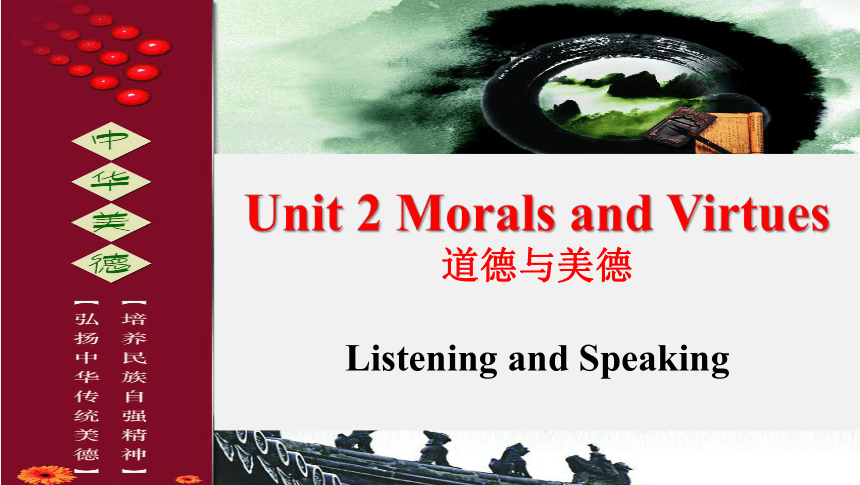
|
|
| 格式 | pptx | ||
| 文件大小 | 15.7MB | ||
| 资源类型 | 教案 | ||
| 版本资源 | 人教版(2019) | ||
| 科目 | 英语 | ||
| 更新时间 | 2024-06-24 19:54:11 | ||
图片预览

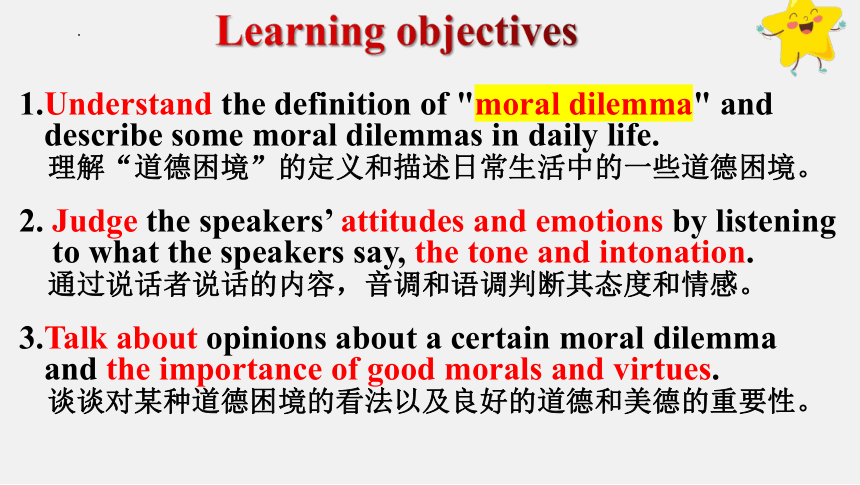
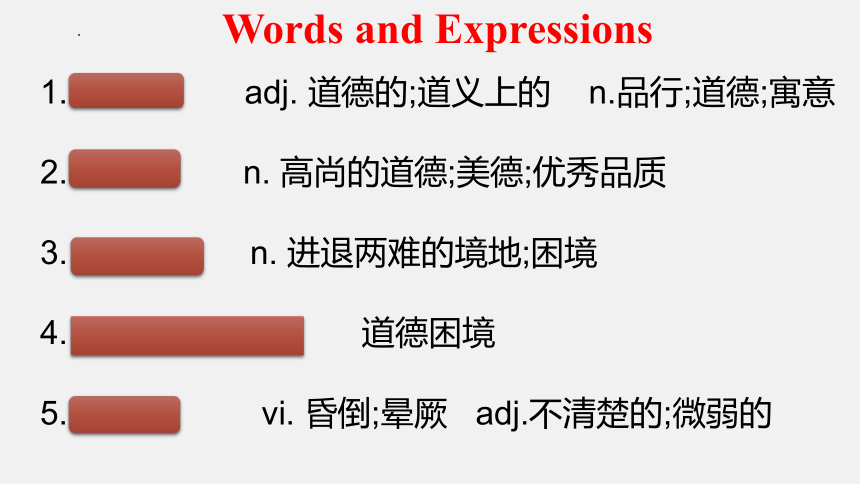

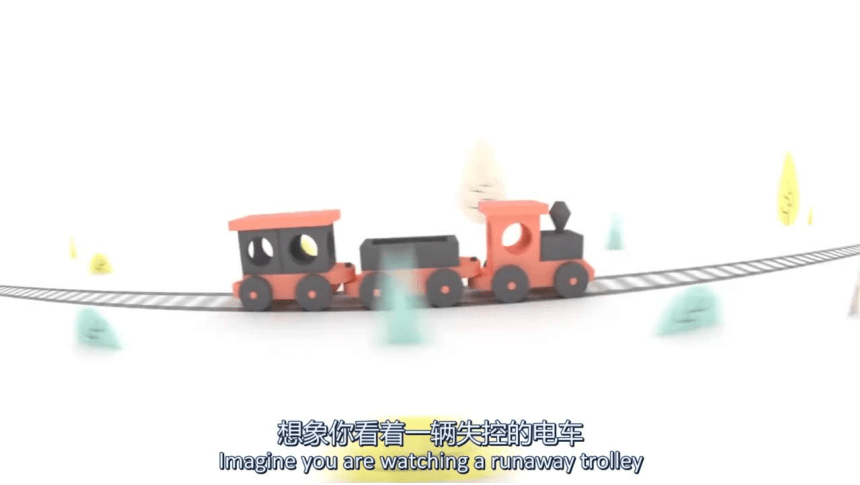


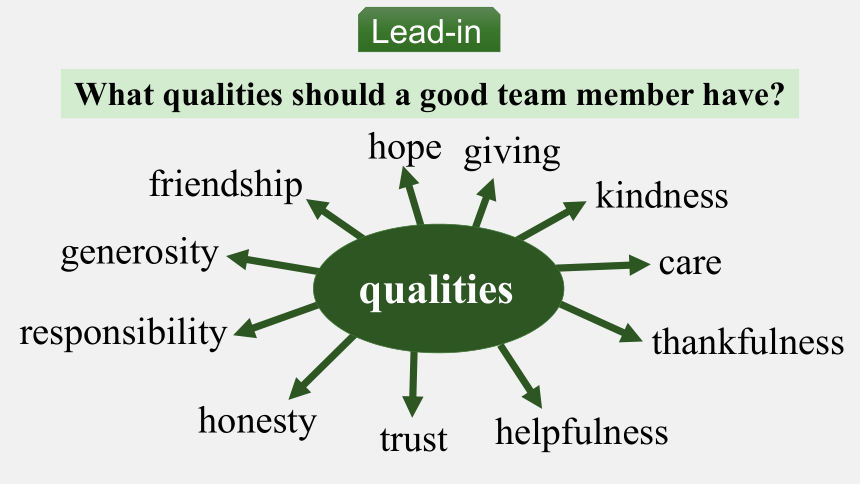

文档简介
(共28张PPT)
Unit 2 Morals and Virtues
道德与美德
Listening and Speaking
Learning objectives
1.Understand the definition of "moral dilemma" and
describe some moral dilemmas in daily life.
理解“道德困境”的定义和描述日常生活中的一些道德困境。
2. Judge the speakers’ attitudes and emotions by listening
to what the speakers say, the tone and intonation.
通过说话者说话的内容,音调和语调判断其态度和情感。
3.Talk about opinions about a certain moral dilemma
and the importance of good morals and virtues.
谈谈对某种道德困境的看法以及良好的道德和美德的重要性。
Words and Expressions
1. moral adj. 道德的;道义上的 n.品行;道德;寓意
2. virtue n. 高尚的道德;美德;优秀品质
3. dilemma n. 进退两难的境地;困境
4. moral dilemma 道德困境
5. faint vi. 昏倒;晕厥 adj.不清楚的;微弱的
Who would you rescue first if your mother and I fell into
the river at the same time
A moral dilemma
Let’s watch a video and think about what you would do when you face such a situation.
What’s your understanding of the quote
Can you translate it into Chinese
一个好人一生最好的部分,是他细小的、无名的、不被人记得的出于善良和爱的行为。
Lead-in
good traditional morals
and virtues
1.What do you think the teenagers in the picture are doing
Lead-in
doing teamwork.
2. What qualities should
a good team member
have
generosity
friendship
hope
giving
kindness
care
thankfulness
helpfulness
trust
honesty
responsibility
What qualities should a good team member have
Lead-in
qualities
determined
strong-willed
independent
selfless
brave
courageous
/k re d s/
friendly
kind
patriotic
/ p tri t k/
responsible
意志坚定的
独立的
无私的
勇敢的
爱国的
友善的
有责任心的
Can you list some virtues that are admired in every culture
good virtues
What’s happening in the picture (Who When Where What )
On his way to school, a boy sees an old woman
who has fallen down on the street.
She needs help getting up.
How to do:
Stop to help her.
Go to take the exam.
Results:
Be late for the exam.
The old woman can’t get timely help.
Situation:
Problem:
a moral dilemma
Pre-listening
What is a moral dilemma
Help or not
A moral dilemma is a situation in which you have two or more choices to make. If you choose one, you might get in trouble for not choosing the other(s).
Listen to the conversation and complete the table to describe the moral dilemma that Jane is talking about.
Situation The girl is taking the entrance examination for ____________ ______________ in Beijing. During the exam, the student next to her fainted. The girl’s choices She can _____________. or She can __________________.
Possible results She will ___ ___medical university, but the girl might not___ ___ ___ ___ ___. She can put the needs of
___ _____ ____ first, but
__ ___ ____ ___ to get into the medical university.
Listening and Speaking: Task 1
university
a medical
finish the exam
stop and help the student
the other person
give up her chance
get into
she needs
get the help
Listen again and decide whether the statements are true (T) or false (F).
1. Jane is eager to share the magazine article with Luke.
2. Luke doubts that young people face moral dilemmas all
the time.
3. Jane admires what the girl in the story did.
4. Luke doesn’t believe anybody would do what the girl in
the story did.
5. Jane wonders how the girl became a doctor later.
Listening and Speaking: Task 2
Listen for attitudes
When you listen, you should pay attention not only to the words but also to HOW the speaker is talking.
1. If people strongly disagree with something, they might exaggerate their intonation.
2. If you hear people speaking very quickly or loudly, they may be excited or angry.
3. If they speak slowly or stop often, they may be confused or not sure about what they are saying.
1. Jane is eager to share the magazine article with Luke.
2. Luke doubts that young people face moral dilemmas
all the time.
3. Jane admires what the girl in the story did.
4. Luke doesn’t believe anybody would do what the girl
in the story did.
5. Jane wonders how the girl became a doctor later.
T
F
T
F
T
F
T
F
T
F
Listen for attitudes:
When you listen, you should pay attention not only to the
words but also to HOW the speaker is talking. If people
strongly disagree with something, they might exaggerate
their intonation. If you hear people speaking very quickly or
loudly, they may be excited or angry. If they speak slowly or
stop often, they may be confused or not sure about what
they are saying.
J: Oh, hey, Luke! I’m reading a very interesting
magazine article about moral dilemmas.
L: Oh, situations like that don’t happen very often,
do they
J: Well, that’s what I thought--but not this girl. She
stopped to help the student, thinking that it was
better to put the needs of the other person first.
L: I can’t believe she would give up her chance to
get into medical university! Who would do such a
thing
Listen again and decide whether the statements are true (T) or
false (F).
Listen to the conversation carefully and answer the questions.
1. What did the girl do to help the student
She _______________to a safe place and___________ her. Then she __________________with the student and called her sister.
2. What was the girl’s name What was she famous for
Her name was___________. She later became_____________. She was famous for____________________women and their babies.
3. What did Jane say about the girl’s life
Her life was _________________, but she didn’t let them stop her ________________people who ___________. She always _________ __________for herself.
Listening and Speaking: Task 3
1. What did the girl do to help the student
She _________________to a safe place and ___________ her.
Then she ________________with the student and called her sister.
2. What was the girl’s name What was she famous for
Her name was ____________. She later became ____________.
She was famous for _____________________________ women and their babies.
3. What did Jane say about the girl’s life
Her life was __________________, but she didn’t let them stop
her _________________people who ___________. She always
___________________________for herself.
carried the student
looked after
went to the hospital
Lin Qiaozhi
a great doctor
caring for tens of thousands of
full of hard choices
from taking care of
were in need
cared for others more than
Listening and Speaking听力原文
Luke: Hi Jane! What are you reading
Jane: Oh, hey, Luke! I’m reading a very interesting magazine article about moral dilemmas.
Luke: Moral dilemma What do you mean
Jane: You know, it's when you have two choices, and you have to choose one, but for moral reasons sometimes it could be really difficult to decide.
Luke: Oh, situations like that don’t happen very often, do they
Jane: Actually, I think people face moral dilemmas all the time, even us students.
Luke: Really Like what
Jane: Well, for example, it mentions a girl who was taking the entrance exam for a medical university in Beijing. During the exam, the student next to her fainted. The girl had a choice. Should she finish the exam or should she stop and help the student
Luke: I can’t believe she would give up her chance to get into medical university! Who would do such a thing
Luke: Surely the teachers would look after the student who fainted!
Jane: Well, that’s what I thought—but not this girl. She stopped to help the student, thinking that it was better to put the needs of the other person first.
Luke: So what happened to her exam
Jane: She never finished it. Instead, she carried the student to a safe place and looked after her. Then she went to the hospital with the student and called her sister.
Jane: Well, that girl was Lin Qiaozhi. She later did get into medical university and then she became a great doctor. She became famous for caring for tens of thousands of women and their babies.
Luke: Oh, wow! So she became a doctor even though she left her exam that day!
Jane: Yes. Her life was full of hard choices, but she didn’t let them stop her from taking care of people who were in need. She always cared for others more than for herself.
Talk about what you would do if you were ever faced with the same situation as the girl. Then share your thoughts with your group, and explain the reasons for your choice.
A:If I were ever in a situation like the one the girl faced, I
think I would choose to _________________________.
B:Why Are you sure
A:Because I think that ________ is the most important.
What about you
B:I think I would _________________.
help her and send her to the
nearest hospital
for us life
do the same as you
Task 3: Speaking
Example:
I once saw my friend cheat on a test. I knew that I should report him, but if I did, he would no longer be my friend.
Task 3: Speaking
Now try to think about more dilemmas you have faced in your life.
1 moral dilemmas
2 take the entrance examination
3 all the time
4 strongly disagree with sth
5 exaggerate one’s intonation
6 be confused about
7 be faced with
8 look gloomy
道德困境
参加入学考试
总是;一直
强烈不同意某事
扩大音量;夸大语调
对……感到茫然
面临;面对
看起来很阴郁;令人沮丧
Language points: Important phrases (P14 ~ P16)
英语口语升调用法表
用法 例句
1. 一般疑问句中 Have you been to Beijing
Do you like English
2.选择疑问句前升后降 Would you like tea or coffee
3. 置于句首的状语(副词,介短,状语从句) If he comes, please tell me.
Luckily, he passed the exam.
4. 并列句的第一个分句, 表示 句子未说完 He studied hard, but he still didn’t pass the exam.
5. 用于呼唤对方 Sir, you are in my way.
See you, Tom.
Pronunciation
英语口语中升调用法表:
用法 例句
6. 列举事物前升后降 One, two, three and four.
red, blue, white and black.
7. 在委婉的祈使句中 Wait a moment.
Don't worry.
8. 反义疑问句后半部分,表示不确定的态度或征求对方的看法 You don't speak Chinese, do you
9. 高升调High rise,用于疑问句中,表强烈惊讶或难以置信的情绪 --Sorry, but I lost the keys.
-- What You lost my keys
Pronunciation
Pronunciation---Exercise
1. Listen to the conversation and match each rising intonation with its meaning.
1). A: You know Angela
B: ↗Yes.
2). A: You volunteer at the local
shelter, ↗don’t you
B: Yes. It’s a great experience.
3). A: Did you hear that James helped an old woman who fell down
while crossing the street
B: Yes. It was a bit ↗dangerous, but he got all the cars to stop.
A Having more to say.
B Hoping the other person will
continue to talk.
C Asking for confirmation.
B
C
A
Pronunciation---Exercise
2.Read the conversation and mark ↗ in the correct places. Then listen to the recording to check. Notice the meaning of each rising intonation.
Peter: It’s a nice day, isn’t it
Nick: Yes, but it looks gloomy to me.
Peter: Why What happened
Nick: You know Tony
Peter: Yes.
Nick: He asked me to write an essay for him. But I don’t think it’s
the right thing to do. Do you
Peter: No, it’s not.
B
C
C
Nick: But I’m afraid to lose him as a friend.
Peter: Well, good friends should help each other. But it doesn’t
mean you should help him cheat ! Why not help him with
his schoolwork
Nick: Good idea!
Pronunciation---Exercise
C
Unit 2 Morals and Virtues
道德与美德
Listening and Speaking
Learning objectives
1.Understand the definition of "moral dilemma" and
describe some moral dilemmas in daily life.
理解“道德困境”的定义和描述日常生活中的一些道德困境。
2. Judge the speakers’ attitudes and emotions by listening
to what the speakers say, the tone and intonation.
通过说话者说话的内容,音调和语调判断其态度和情感。
3.Talk about opinions about a certain moral dilemma
and the importance of good morals and virtues.
谈谈对某种道德困境的看法以及良好的道德和美德的重要性。
Words and Expressions
1. moral adj. 道德的;道义上的 n.品行;道德;寓意
2. virtue n. 高尚的道德;美德;优秀品质
3. dilemma n. 进退两难的境地;困境
4. moral dilemma 道德困境
5. faint vi. 昏倒;晕厥 adj.不清楚的;微弱的
Who would you rescue first if your mother and I fell into
the river at the same time
A moral dilemma
Let’s watch a video and think about what you would do when you face such a situation.
What’s your understanding of the quote
Can you translate it into Chinese
一个好人一生最好的部分,是他细小的、无名的、不被人记得的出于善良和爱的行为。
Lead-in
good traditional morals
and virtues
1.What do you think the teenagers in the picture are doing
Lead-in
doing teamwork.
2. What qualities should
a good team member
have
generosity
friendship
hope
giving
kindness
care
thankfulness
helpfulness
trust
honesty
responsibility
What qualities should a good team member have
Lead-in
qualities
determined
strong-willed
independent
selfless
brave
courageous
/k re d s/
friendly
kind
patriotic
/ p tri t k/
responsible
意志坚定的
独立的
无私的
勇敢的
爱国的
友善的
有责任心的
Can you list some virtues that are admired in every culture
good virtues
What’s happening in the picture (Who When Where What )
On his way to school, a boy sees an old woman
who has fallen down on the street.
She needs help getting up.
How to do:
Stop to help her.
Go to take the exam.
Results:
Be late for the exam.
The old woman can’t get timely help.
Situation:
Problem:
a moral dilemma
Pre-listening
What is a moral dilemma
Help or not
A moral dilemma is a situation in which you have two or more choices to make. If you choose one, you might get in trouble for not choosing the other(s).
Listen to the conversation and complete the table to describe the moral dilemma that Jane is talking about.
Situation The girl is taking the entrance examination for ____________ ______________ in Beijing. During the exam, the student next to her fainted. The girl’s choices She can _____________. or She can __________________.
Possible results She will ___ ___medical university, but the girl might not___ ___ ___ ___ ___. She can put the needs of
___ _____ ____ first, but
__ ___ ____ ___ to get into the medical university.
Listening and Speaking: Task 1
university
a medical
finish the exam
stop and help the student
the other person
give up her chance
get into
she needs
get the help
Listen again and decide whether the statements are true (T) or false (F).
1. Jane is eager to share the magazine article with Luke.
2. Luke doubts that young people face moral dilemmas all
the time.
3. Jane admires what the girl in the story did.
4. Luke doesn’t believe anybody would do what the girl in
the story did.
5. Jane wonders how the girl became a doctor later.
Listening and Speaking: Task 2
Listen for attitudes
When you listen, you should pay attention not only to the words but also to HOW the speaker is talking.
1. If people strongly disagree with something, they might exaggerate their intonation.
2. If you hear people speaking very quickly or loudly, they may be excited or angry.
3. If they speak slowly or stop often, they may be confused or not sure about what they are saying.
1. Jane is eager to share the magazine article with Luke.
2. Luke doubts that young people face moral dilemmas
all the time.
3. Jane admires what the girl in the story did.
4. Luke doesn’t believe anybody would do what the girl
in the story did.
5. Jane wonders how the girl became a doctor later.
T
F
T
F
T
F
T
F
T
F
Listen for attitudes:
When you listen, you should pay attention not only to the
words but also to HOW the speaker is talking. If people
strongly disagree with something, they might exaggerate
their intonation. If you hear people speaking very quickly or
loudly, they may be excited or angry. If they speak slowly or
stop often, they may be confused or not sure about what
they are saying.
J: Oh, hey, Luke! I’m reading a very interesting
magazine article about moral dilemmas.
L: Oh, situations like that don’t happen very often,
do they
J: Well, that’s what I thought--but not this girl. She
stopped to help the student, thinking that it was
better to put the needs of the other person first.
L: I can’t believe she would give up her chance to
get into medical university! Who would do such a
thing
Listen again and decide whether the statements are true (T) or
false (F).
Listen to the conversation carefully and answer the questions.
1. What did the girl do to help the student
She _______________to a safe place and___________ her. Then she __________________with the student and called her sister.
2. What was the girl’s name What was she famous for
Her name was___________. She later became_____________. She was famous for____________________women and their babies.
3. What did Jane say about the girl’s life
Her life was _________________, but she didn’t let them stop her ________________people who ___________. She always _________ __________for herself.
Listening and Speaking: Task 3
1. What did the girl do to help the student
She _________________to a safe place and ___________ her.
Then she ________________with the student and called her sister.
2. What was the girl’s name What was she famous for
Her name was ____________. She later became ____________.
She was famous for _____________________________ women and their babies.
3. What did Jane say about the girl’s life
Her life was __________________, but she didn’t let them stop
her _________________people who ___________. She always
___________________________for herself.
carried the student
looked after
went to the hospital
Lin Qiaozhi
a great doctor
caring for tens of thousands of
full of hard choices
from taking care of
were in need
cared for others more than
Listening and Speaking听力原文
Luke: Hi Jane! What are you reading
Jane: Oh, hey, Luke! I’m reading a very interesting magazine article about moral dilemmas.
Luke: Moral dilemma What do you mean
Jane: You know, it's when you have two choices, and you have to choose one, but for moral reasons sometimes it could be really difficult to decide.
Luke: Oh, situations like that don’t happen very often, do they
Jane: Actually, I think people face moral dilemmas all the time, even us students.
Luke: Really Like what
Jane: Well, for example, it mentions a girl who was taking the entrance exam for a medical university in Beijing. During the exam, the student next to her fainted. The girl had a choice. Should she finish the exam or should she stop and help the student
Luke: I can’t believe she would give up her chance to get into medical university! Who would do such a thing
Luke: Surely the teachers would look after the student who fainted!
Jane: Well, that’s what I thought—but not this girl. She stopped to help the student, thinking that it was better to put the needs of the other person first.
Luke: So what happened to her exam
Jane: She never finished it. Instead, she carried the student to a safe place and looked after her. Then she went to the hospital with the student and called her sister.
Jane: Well, that girl was Lin Qiaozhi. She later did get into medical university and then she became a great doctor. She became famous for caring for tens of thousands of women and their babies.
Luke: Oh, wow! So she became a doctor even though she left her exam that day!
Jane: Yes. Her life was full of hard choices, but she didn’t let them stop her from taking care of people who were in need. She always cared for others more than for herself.
Talk about what you would do if you were ever faced with the same situation as the girl. Then share your thoughts with your group, and explain the reasons for your choice.
A:If I were ever in a situation like the one the girl faced, I
think I would choose to _________________________.
B:Why Are you sure
A:Because I think that ________ is the most important.
What about you
B:I think I would _________________.
help her and send her to the
nearest hospital
for us life
do the same as you
Task 3: Speaking
Example:
I once saw my friend cheat on a test. I knew that I should report him, but if I did, he would no longer be my friend.
Task 3: Speaking
Now try to think about more dilemmas you have faced in your life.
1 moral dilemmas
2 take the entrance examination
3 all the time
4 strongly disagree with sth
5 exaggerate one’s intonation
6 be confused about
7 be faced with
8 look gloomy
道德困境
参加入学考试
总是;一直
强烈不同意某事
扩大音量;夸大语调
对……感到茫然
面临;面对
看起来很阴郁;令人沮丧
Language points: Important phrases (P14 ~ P16)
英语口语升调用法表
用法 例句
1. 一般疑问句中 Have you been to Beijing
Do you like English
2.选择疑问句前升后降 Would you like tea or coffee
3. 置于句首的状语(副词,介短,状语从句) If he comes, please tell me.
Luckily, he passed the exam.
4. 并列句的第一个分句, 表示 句子未说完 He studied hard, but he still didn’t pass the exam.
5. 用于呼唤对方 Sir, you are in my way.
See you, Tom.
Pronunciation
英语口语中升调用法表:
用法 例句
6. 列举事物前升后降 One, two, three and four.
red, blue, white and black.
7. 在委婉的祈使句中 Wait a moment.
Don't worry.
8. 反义疑问句后半部分,表示不确定的态度或征求对方的看法 You don't speak Chinese, do you
9. 高升调High rise,用于疑问句中,表强烈惊讶或难以置信的情绪 --Sorry, but I lost the keys.
-- What You lost my keys
Pronunciation
Pronunciation---Exercise
1. Listen to the conversation and match each rising intonation with its meaning.
1). A: You know Angela
B: ↗Yes.
2). A: You volunteer at the local
shelter, ↗don’t you
B: Yes. It’s a great experience.
3). A: Did you hear that James helped an old woman who fell down
while crossing the street
B: Yes. It was a bit ↗dangerous, but he got all the cars to stop.
A Having more to say.
B Hoping the other person will
continue to talk.
C Asking for confirmation.
B
C
A
Pronunciation---Exercise
2.Read the conversation and mark ↗ in the correct places. Then listen to the recording to check. Notice the meaning of each rising intonation.
Peter: It’s a nice day, isn’t it
Nick: Yes, but it looks gloomy to me.
Peter: Why What happened
Nick: You know Tony
Peter: Yes.
Nick: He asked me to write an essay for him. But I don’t think it’s
the right thing to do. Do you
Peter: No, it’s not.
B
C
C
Nick: But I’m afraid to lose him as a friend.
Peter: Well, good friends should help each other. But it doesn’t
mean you should help him cheat ! Why not help him with
his schoolwork
Nick: Good idea!
Pronunciation---Exercise
C
